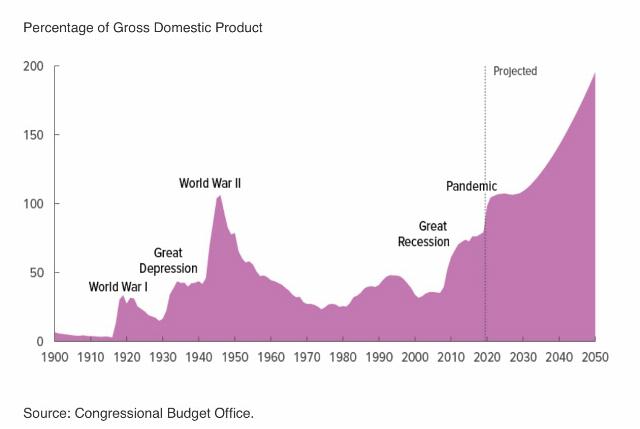What constitutes a national emergency?
The Republicans in Congress, much to their disgrace, allowed vestiges of Green New Deal spending to remain. However, to their credit, they axed a large chunk of it. The symbolism of their action should not be overlooked. They have declared the so-called climate emergency not to be a national crisis. Maybe at a time like this, it would be good to reflect on the effect of other supposed national emergencies in our recent past. The two that loom large are the mortgage crisis of 2008 and COVID-19 pandemic of 2020.
Although most people by now have shelved memories of these events, we are living with their aftermath today. It may come as a shock to some that the Federal government has incurred the same increase in debt relative to GNP in the aftermath of these two events as it did in World War II. I say shocking because no serious person would conceive that the fiscal impact of fighting a war against the Axis powers would equal the spending that was fallout from the mortgage crisis and the Wuhan flu. Looking back, it seems like we lost our minds, spending like a drunken sailor from 2008 onwards. To understand it all, let me take you back a bit.
Seven years prior to the mortgage crisis, there was the dotcom crash in which large amounts of wealth evaporated almost overnight as investors recalibrated their valuation of the tech sector. Few called for a massive government bailout of tech companies or investors. There was a general understanding that the dotcom boom was risky business.
When, in subsequent years, the banking industry transformed itself with full-scale securitization of mortgages and other assets and experienced a hiccup along the way, the reaction should have been the same, but it wasn’t. When investors reassessed downward their estimation of bank stocks, there were calls from all quarters for the government to bail the banking sector out. It was certainly an odd reaction from the public that they would go along with bailing out banks when just prior to the crash these hubris pricks touted themselves as masters of the universe.
The spending did not end with the initial bailout but continued throughout the two terms of Obama. The 2008 banking crisis provided cover for the Obama administration to go on a spending spree. As Obama advisor, Rahm Emanuel said, “You never want a serious crisis to go to waste. And what I mean by that is an opportunity to do things that you think you could not do before.”
2008 would not be the last time that public opinion would baffle me. In 2020, it seemed once again that people had lost their minds by deciding for the first time in history to do something that had never been tried before. We were to shut down the whole economy and send everyone home to cower in fear until the COVID pandemic receded. Again, the federal spending taps were opened and money poured out to keep people in an exquisite state of seclusion.
I know that some readers will object to my sarcastic assessment. They will say that we had to do what we did and preface it by saying that they knew a friend of a friend who died of COVID, and he wasn’t that old. No doubt that happened and no doubt there was human suffering. However, would it not have made more sense for those at risk to isolate themselves and let the rest of us go about our business. We could then rather quickly acquire herd immunity as all previous generations have.
In conclusion, when I hear Alexandria Ocasio-Cortez exclaim that the climate emergency is her generation’s World War II, she is not just yearning to make sandwiches at the local USO for departing soldiers. She wants a $50 trillion makeover of the energy sector that is many times the cost of WWII. It is good that we did not take the advice of this former bartender from Queens and embark on yet another spending spree that would send the debt to stratospheric levels.

Image: Congressional Budget Office.